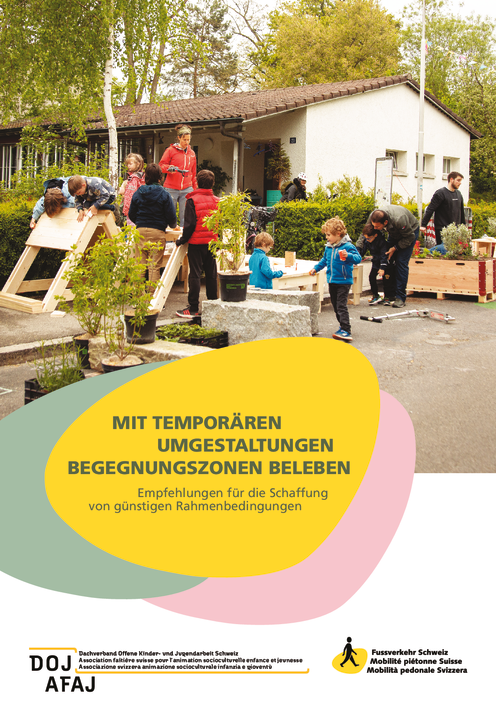Exercice, Enliven, Encounter – Potential at the Doorstep
Shared spaces potential for more quality of life
Street space is, especially in residential neighborhoods, the closest opportunity for children to play outside, it is also an ideal place for daily encounters and exercise for residents of all ages. In Swiss cities such as Bern and Zurich there are more than 100 so-called “shared spaces”, neighborhood streets with a 20 km/h speed limit that give right of way to pedestrians. But despite traffic calming measures, residents seldom make active use of these streets. What is missing that would ensure that the spatial offer meets the resident’s needs?
Project Page in German or French
The impacts of the project are mentioned in this Video from WHO.
Pecha Kucha Presentation at Walk21 Dublin 2022 (20 slides in 6 minutes)
Recommendations for improving Street redesign, 2024 (in German) (Project Summary in English)
Accompanying Study from Bern University of Applied Sciences, 2024 (summary in English)
More information available on the page of the project in German of French
Project Summary: «Exercise, encounter, and enliven in Bern and Zurich neighborhoods»
City streets are public spaces that play a central role in neighborhood life. When streets are embraced as public spaces and are transformed into shared spaces, they not only increase safety, reduce noise pollution, and contribute to cleaner air, they also create welcoming conditions for an array of community leisure activities or even for a neighborhood event space. Despite these opportunities, the potential of many shared spaces has not fully been reached. How can this be changed? How can streets be reclaimed as public spaces? How can we use the very streets outside our doorsteps to promote neighborhood life and community activities, such as playing, exercise, and gathering?
In the summer of 2022, Pedestrian Mobility Switzerland and Dachverband Offene Kinder- und Jugendarbeit Schweiz (DOJ) investigated these questions by launching the project «Encounter, move, enliven in Bern and Zurich neighborhoods.» The project goal was to transform street space into public space. In partnership with residents, two existing shared spaces in Bern and Zurich were redesigned, using temporary changes that were piloted for three months.
Result: A multidisciplinary, temporary, and participatory process does, in fact, promote the transformation of streets into public spaces. The process can be used to test new forms of neighborhood-friendly mobility and cohabitation. The data collected shows that more activity and interactions took place during the three-month pilot period. Simple and cost-effective interventions that enhance public space – and make it more inviting – can contribute to a better quality of life in urban neighborhoods.
Despite these benefits, there are still obstacles to temporarily redesigning street spaces in the planning and approval processes. To the best of our knowledge, there is currently no formal procedure in Switzerland for temporarily redesigning street spaces. It would be beneficial if fewer approval processes were required and if iterative changes after the redesign’s installation were allowed. Additionally, a seamless process to transition a temporary redesign to a long-term transformation is needed.
Innovation: The project was based on a multidisciplinary collaboration between stakeholders in the fields of transportation planning, open space design, and social services. The street space redesign was carried out using a participatory process.
Framework: The cities of Zurich and Bern were involved as implementation partners in the project. The project
was led by Pedestrian Mobility Switzerland in cooperation with DOJ. The pilot project took place as part of the federal government’s «Sustainable Spatial Development 2020 – 2024» model project.
The following resources were also produced as a result of the project:
- A Guide for the public, providing an overview of the process, as well as tips on taking the first steps to transform a street space. The brochure encourages people to enliven shared spaces in residential areas (Trilingual PDF – German, French, Italian).
- An accompanying study, documenting the effect of the project’s redesign measures. (in German)
- A video, podcast, and photo collection, documenting the project.
- A fact sheet for the Organization for Economic Cooperation and Development (OECD), summarizing the project’s health promotion findings. (Mid February 2024)




You must be logged in to post a comment.